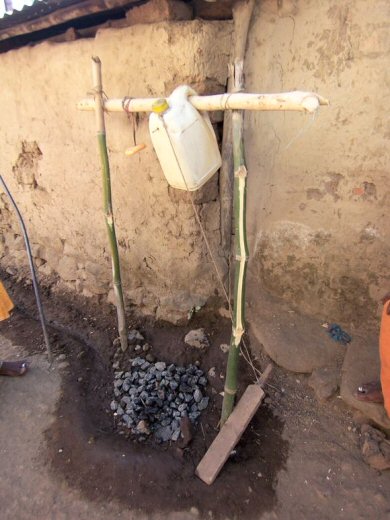PAGEANT - "Education is the future"
'tippytap' for washing hands
Now wash your hands!
We all know that washing your hands after going to the toilet or before touching food is a proven way of preventing the spread of disease. But what if there is no running water?
Introducing the 'tippytap'
The tippytap is a simple device that provides a stream of water and is operated without using your hands, which are probably contaminated. It is also well known that washing with water alone is much less effective than using soap, so the tippytap system includes soap as well.

a typical set-up (photo by permission of tippytap)
All you need is some suitable tree branches, a plastic water container, some strong string, a piece of soap and the simplest tool kit ever - a nail and a candle.
- The main working part of the tippytap is a plastic water container with a hole drilled near the top.
- What about the nail and candle? You use the candle to heat the nail, so you can make a clean hole in the container.
- The water container is pivoted on a horizontal pole, so when it is tipped forward, a stream of water runs out of the hole.
- The tippytap is operated by a piece of string attached to a foot operated stick. You don't need to use your hands, so there is no chance of cross contamination between users.
- Each tippytap has a piece of soap on a string, so it's always there when you need it.
- The tippytap uses far less water than the usual mug and bucket system, typically 40ml per wash - very important in regions with a water shortage.
- The tippytap can be built using reclaimed or scavenged items, so is very low cost. Schools and communities can afford to have several - near toilets, near food preparation areas and anywhere else where you could get your hands dirty.
- The tippytap is very easy to put together - even children can do it. Download the instructions here
- The set-up is completed with a gravel filled basin under the tippytap to stop the ground turning into a muddy mess. Waste water can run off to irrigate plants.
The tippytap is in use in many places in Africa, India and the Caribbean. It is also useful in developed countries, for instance by scouts and guides on their camping trips. Have a look at the tippytap website, where there is a wealth of useful information.